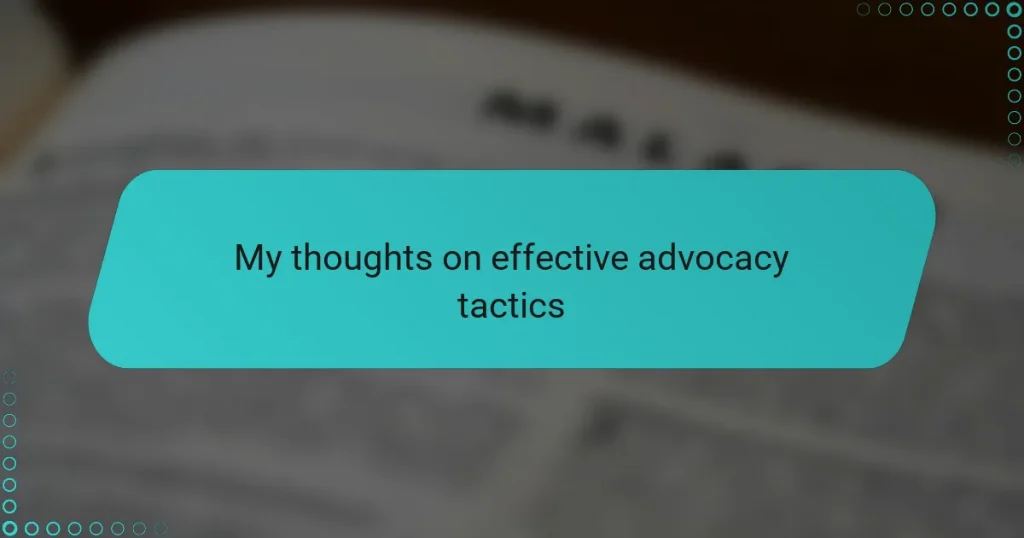Key takeaways
- Legal advocacy combines deep legal knowledge with empathy and effective communication to champion causes and influence outcomes.
- Key principles of effective advocacy include clarity, thorough preparation, and the ability to connect emotionally with clients.
- Success in advocacy is measured not just by case outcomes, but also by the broader impact, including raising awareness and fostering community engagement.
- Continuous improvement in advocacy skills requires practice, active listening, and the power of storytelling to relate facts compellingly.
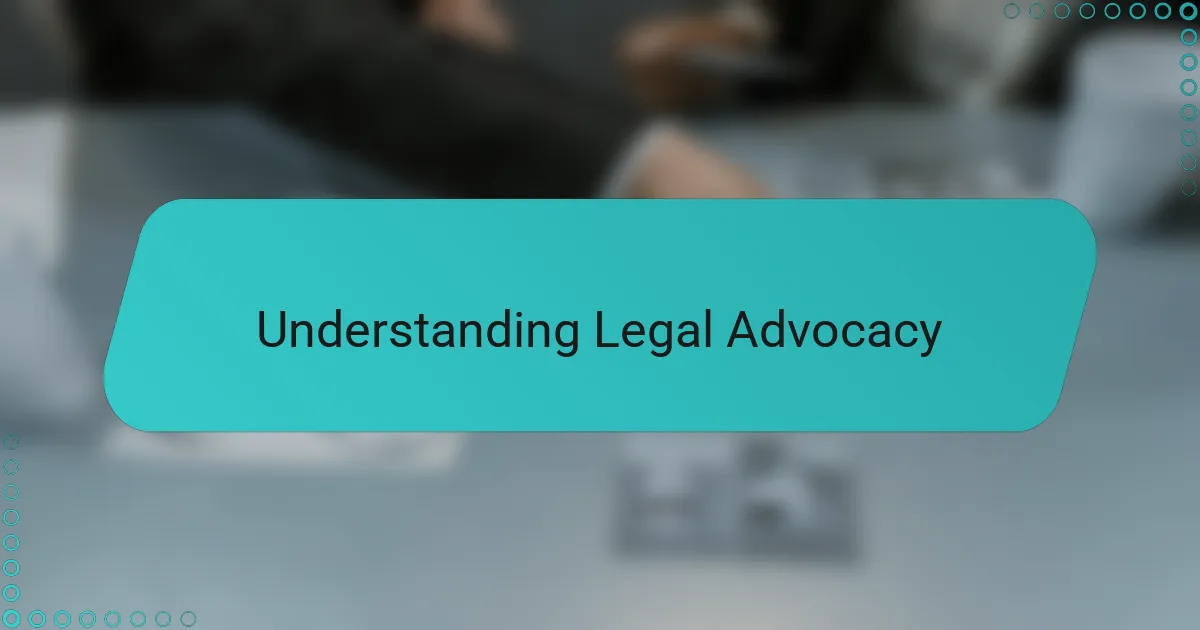
Understanding Legal Advocacy
Legal advocacy, to me, is more than just arguing cases in court; it’s about championing a cause with passion and precision. I remember early in my career feeling overwhelmed by complex procedures, but I soon realized that understanding the human element behind each case made all the difference. How often do we forget that legal advocacy is fundamentally about people’s lives and their rights?
When I think about legal advocacy, I see it as a bridge between the law and justice. It requires not only a deep knowledge of legal principles but also the ability to communicate effectively and persuasively. Have you ever noticed how the strongest advocates combine empathy with strategy to influence outcomes?
In my experience, truly grasping what legal advocacy entails means recognizing its role as both a skill and an art. It’s a dynamic process that evolves with each new challenge, pushing advocates to be adaptable while staying rooted in ethical commitments. This blend of knowledge, passion, and adaptability is what makes legal advocacy so compelling.
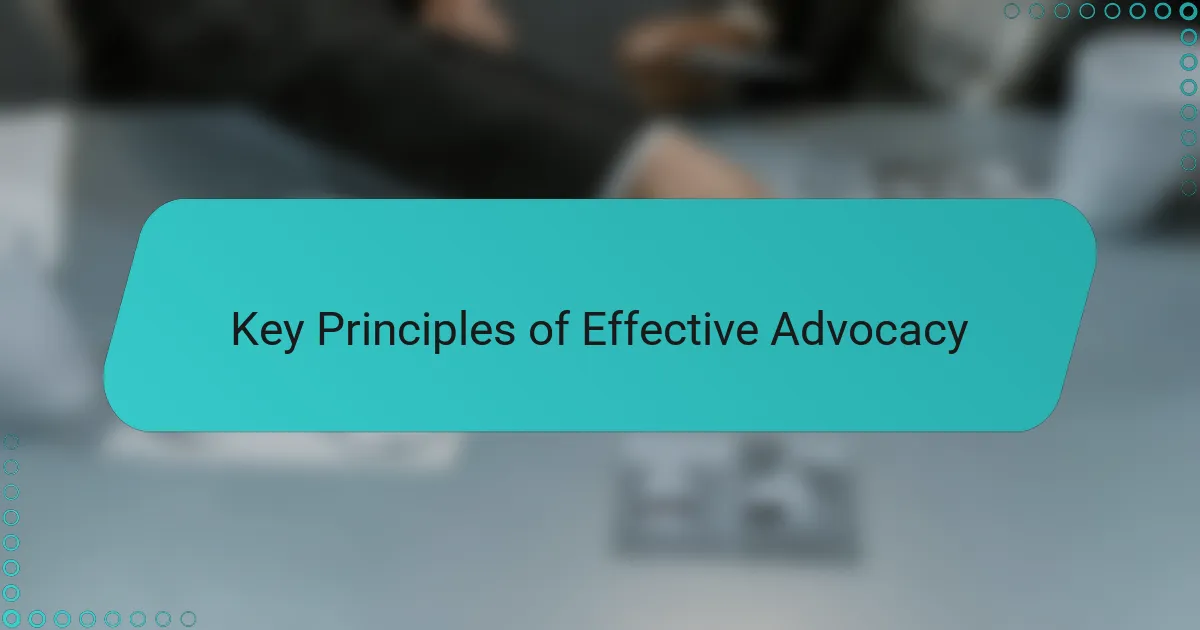
Key Principles of Effective Advocacy
One key principle I’ve found essential in effective advocacy is clarity. Early on, I struggled with trying to sound too sophisticated, but I quickly learned that clear, straightforward communication is far more persuasive. Have you ever sat through a legal argument that felt like a maze? Avoiding that confusion keeps your message sharp and accessible.
Another principle that stands out to me is preparation. I remember a case where thorough research uncovered a small but critical detail that turned the tide completely. It’s moments like those that show how diligence behind the scenes builds the foundation for success in the courtroom or negotiation table.
Lastly, I can’t stress enough the importance of empathy. Advocates who truly listen and connect with the people they represent often find themselves more effective. When you understand someone’s story beyond the facts, doesn’t it naturally fuel a stronger, more authentic argument? That connection can transform how your advocacy resonates.
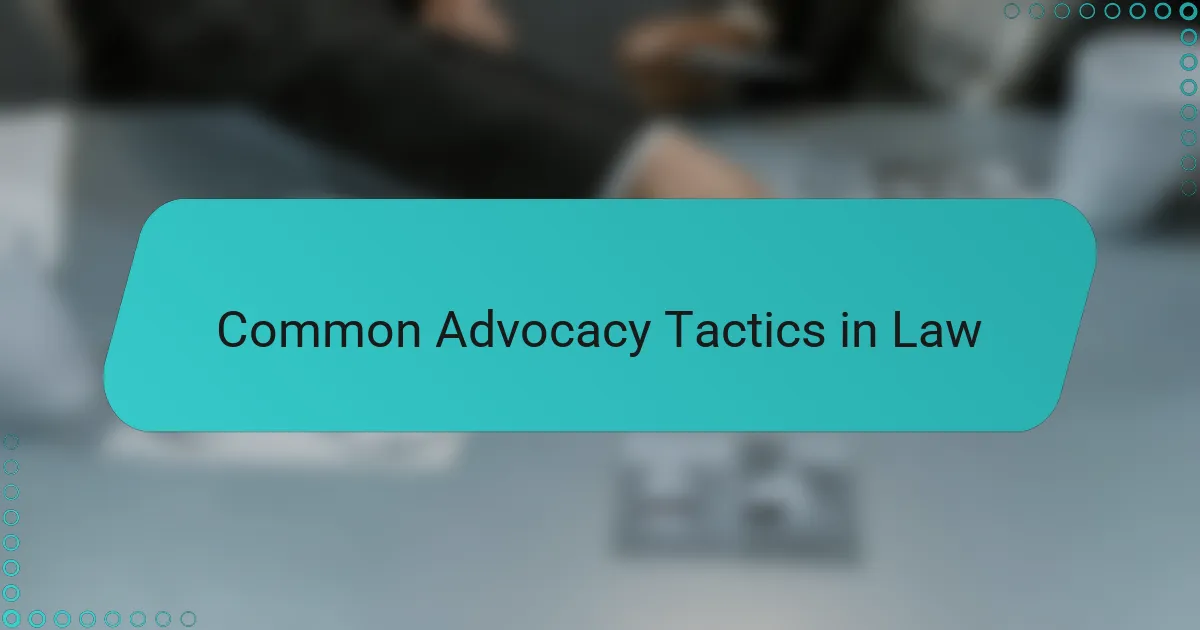
Common Advocacy Tactics in Law
Common advocacy tactics in law often start with thorough case investigation. I recall a moment when digging deeper into a client’s background revealed a critical fact others had overlooked. Isn’t it fascinating how something seemingly minor can become a game-changer in legal arguments?
Another tactic I rely on is storytelling. When presenting a case, framing facts within a compelling narrative helps humanize complex legal issues. Have you ever seen how a well-told story can sway a judge or jury more effectively than dry recitation of facts? That connection turns cold evidence into relatable experience.
I also find strategic negotiation indispensable. It’s not just about confrontation but about finding common ground and creative solutions. Sometimes, walking into a room ready to listen rather than just to argue leads to outcomes that benefit everyone involved. Don’t you think that a flexible approach often marks the difference between success and stalemate?
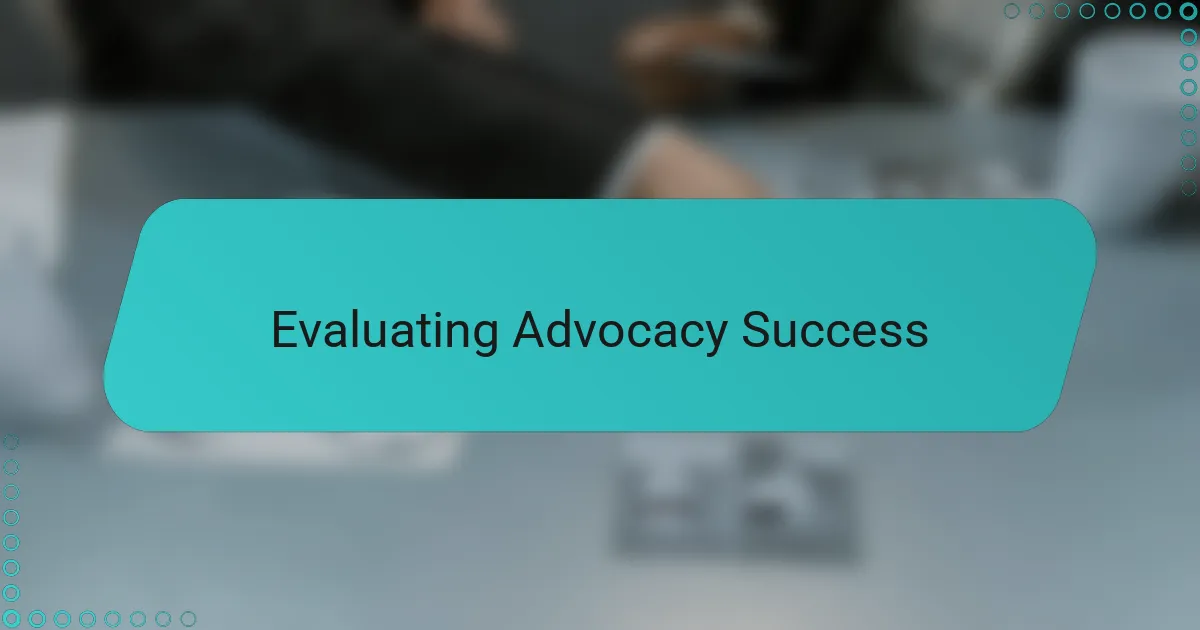
Evaluating Advocacy Success
When I evaluate advocacy success, I don’t just look at whether a case was won or lost. Instead, I think about the broader impact—did the advocacy bring attention to an overlooked issue or inspire change beyond the courtroom? Sometimes, success is subtle and unfolds long after the final judgment.
Measuring tangible results can feel straightforward, like a favorable verdict or a new policy adopted. But in my experience, the real challenge lies in assessing less visible outcomes, such as shifts in public perception or strengthened community voices. Have you ever considered how these quieter victories shape the future of advocacy work?
Reflecting on my cases, I often ask myself whether my approach stayed true to ethical standards and maintained respect for all parties involved. Success isn’t just winning; it’s also about integrity and the lasting relationships built along the way. Isn’t that what ultimately sustains effective advocacy over time?
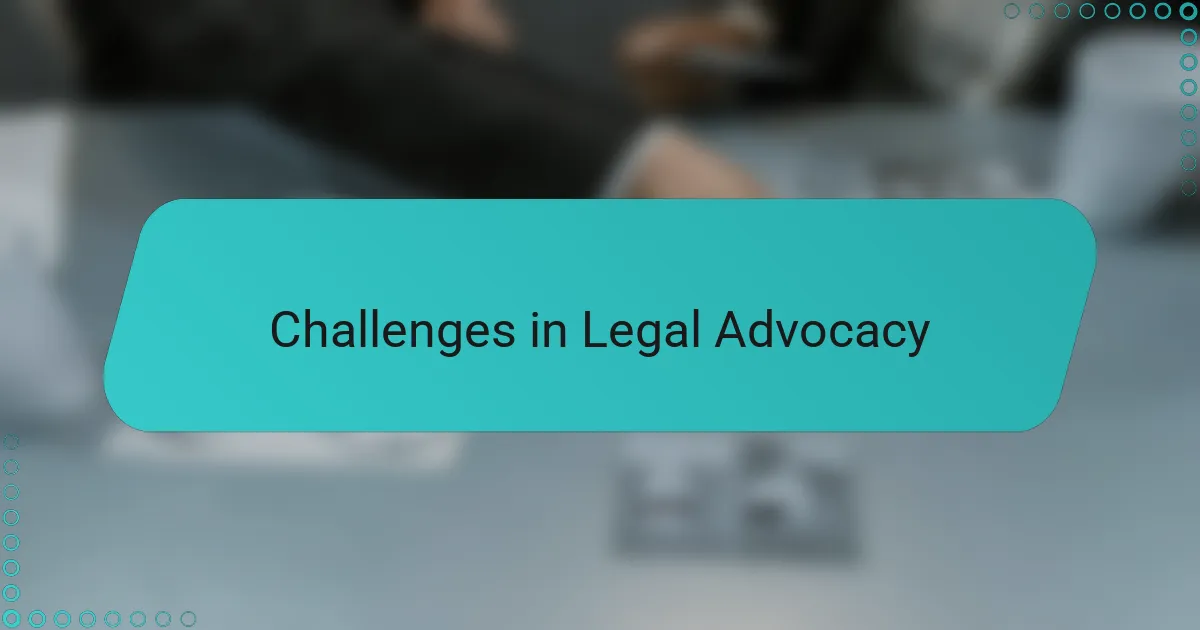
Challenges in Legal Advocacy
Legal advocacy is full of challenges that can test even the most seasoned advocates. I remember a case early in my career where conflicting evidence made it nearly impossible to build a clear argument. Have you ever felt stuck trying to navigate through murky facts while needing to maintain a strong position? It’s frustrating, but it also pushes you to sharpen your analytical skills and creativity.
Another challenge I often encounter is balancing passion with professionalism. It’s easy to get emotionally invested in a cause, especially when clients’ lives are at stake. Yet, I’ve learned that letting emotions override strategy can cloud judgment. How do you stay empathetic without losing the objectivity essential for effective advocacy? Striking that balance remains a constant learning process.
Time constraints and procedural complexities also weigh heavily on advocates. Deadlines can feel relentless, and legal protocols sometimes seem designed to trip you up. I recall preparing extensively for a hearing, only to have unexpected paperwork issues disrupt the entire flow. Does navigating these hurdles ever make you question whether the system itself is an obstacle? It’s those moments that demand resilience and meticulous attention to detail.
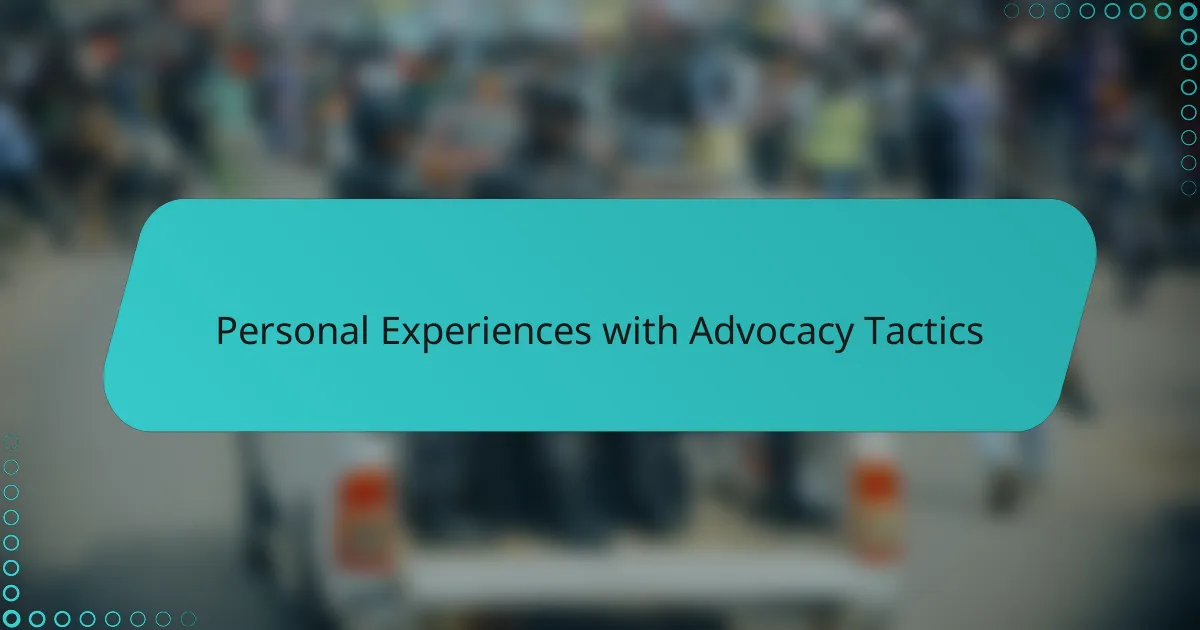
Personal Experiences with Advocacy Tactics
One experience that sticks with me involved a tense negotiation where patience became my greatest advocate. I had to sit quietly through long silences, resisting the urge to fill every gap with words. Have you ever noticed how listening more than speaking can sometimes shift the entire dynamic in your favor?
I also recall a time when tailoring my message to the audience made all the difference. Speaking plainly to a panel unfamiliar with legal jargon helped demystify complex issues and opened doors to meaningful dialogue. It made me realize that advocacy isn’t just about what you say, but how you connect with others in the room.
There was a deeply moving case where understanding the client’s personal story transformed my approach. By stepping beyond legal facts and truly empathizing, I found my arguments gained genuine conviction. Don’t you think that blending legal skill with heartfelt commitment is what makes advocacy resonate on a profound level?
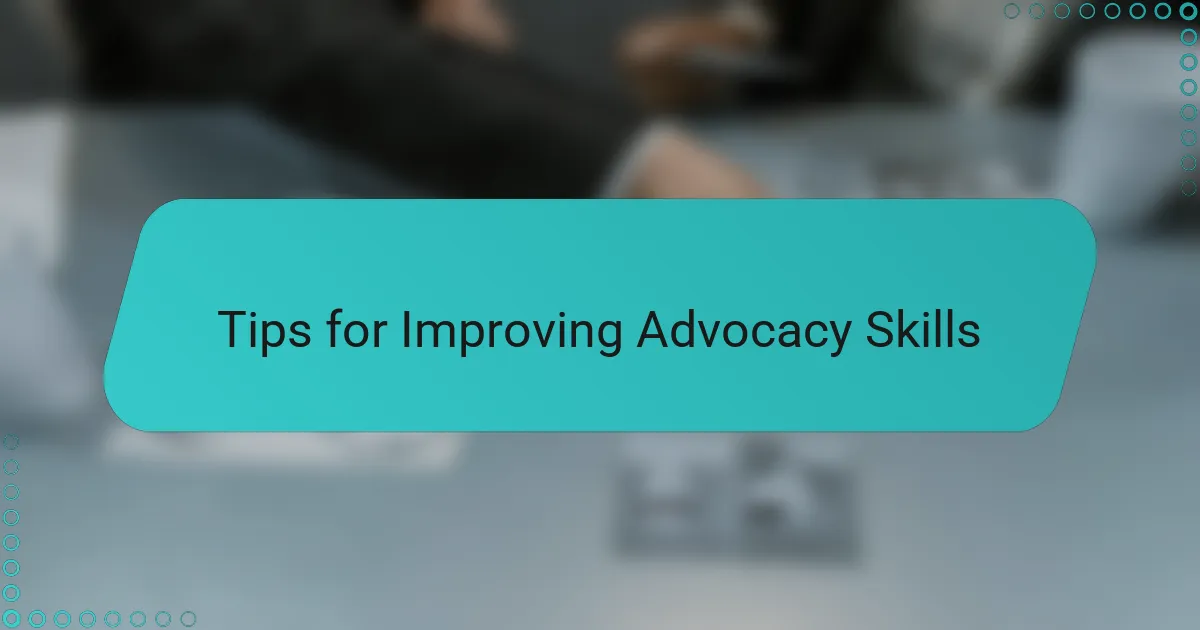
Tips for Improving Advocacy Skills
Improving advocacy skills, in my experience, boils down to constant practice and reflection. I remember early on feeling awkward during oral arguments, but with deliberate effort and seeking feedback, I saw how each small adjustment sharpened my effectiveness. Have you ever noticed that the more you engage in advocacy, the more natural and confident it becomes?
Another tip I often rely on is honing active listening. Truly hearing what clients, colleagues, and even opposing counsel say—not just waiting to speak—can reveal insights that change your entire approach. Isn’t it fascinating how listening patiently sometimes uncovers the strongest points you hadn’t considered?
Finally, never underestimate the power of storytelling. I once had a case where presenting the facts through a relatable narrative captured the judge’s attention much more than dry legalese ever could. How often do we forget that connecting emotionally through stories can transform our advocacy from mere argument to compelling persuasion?
